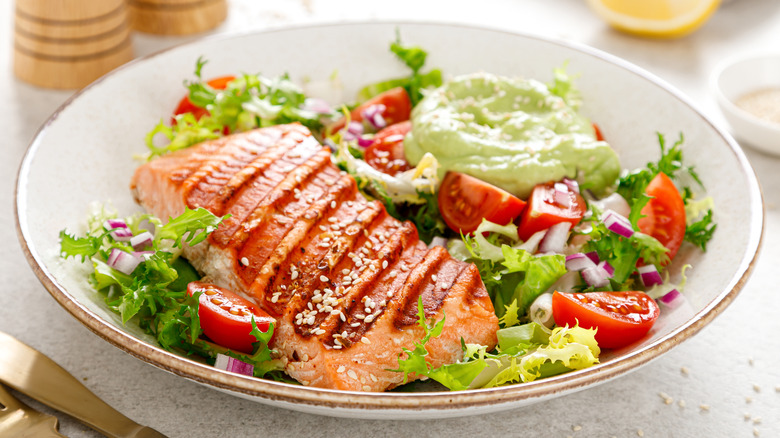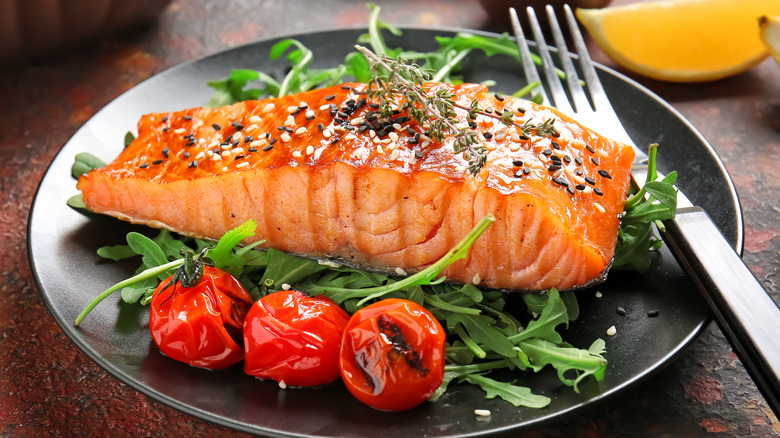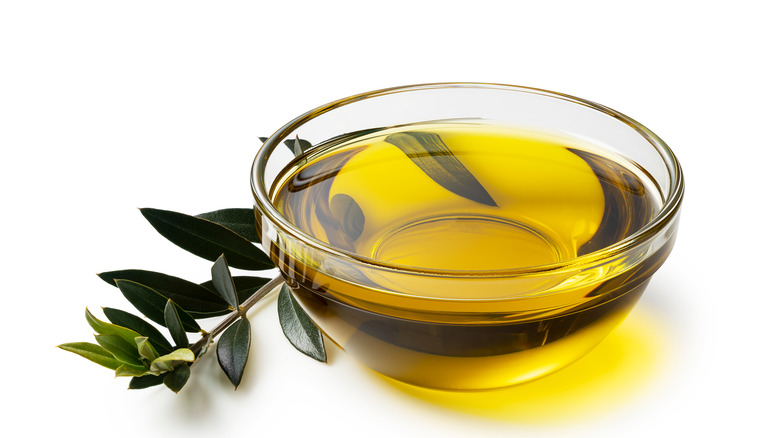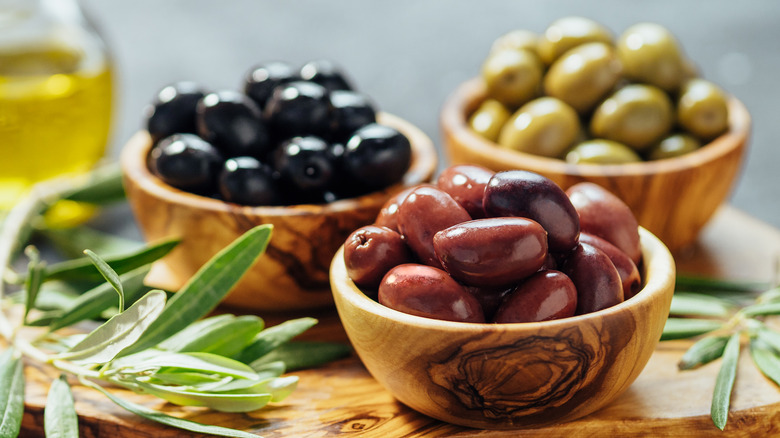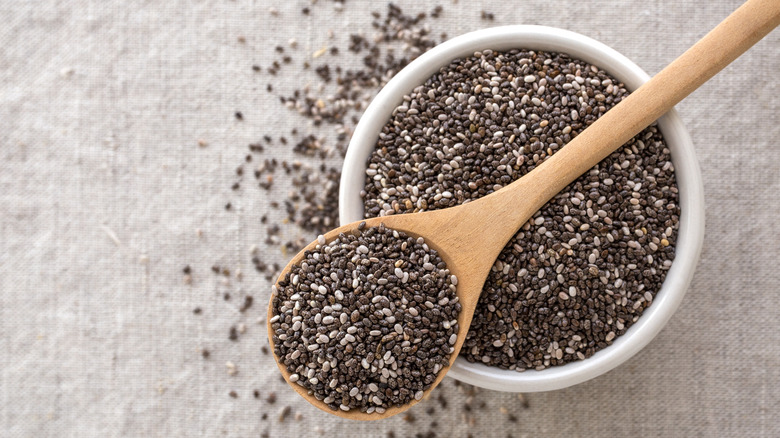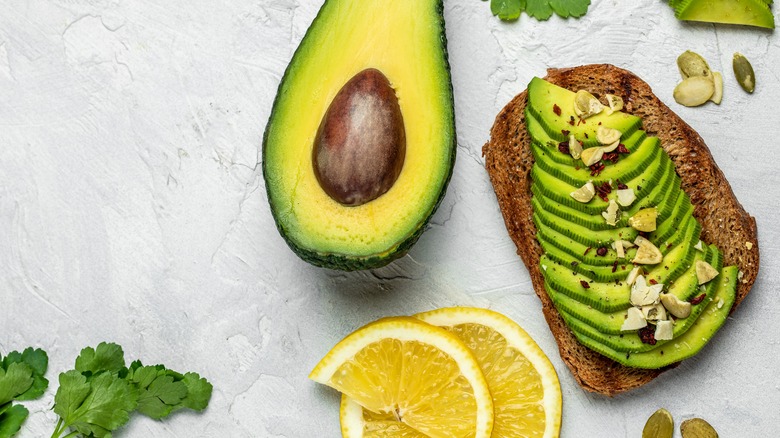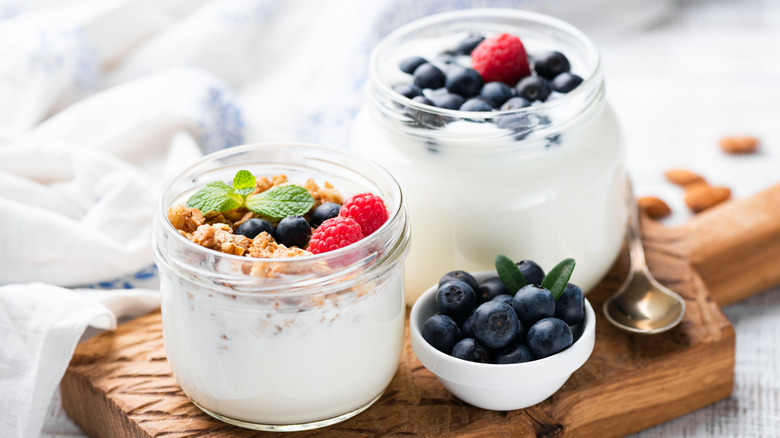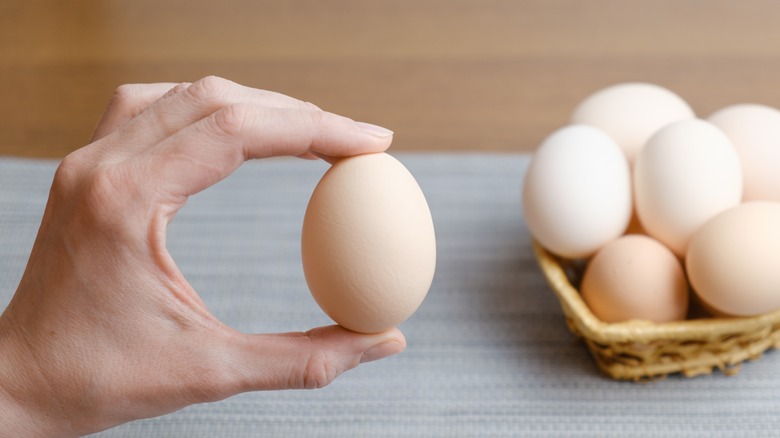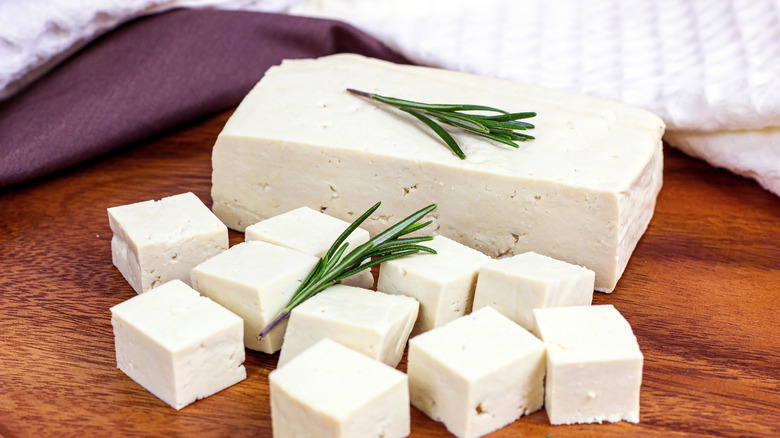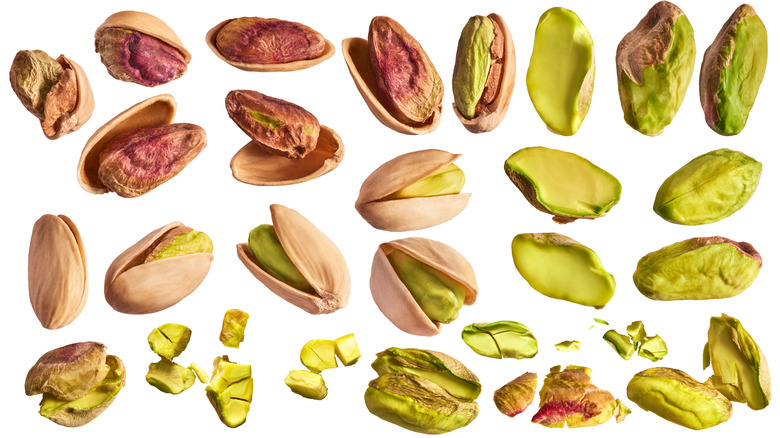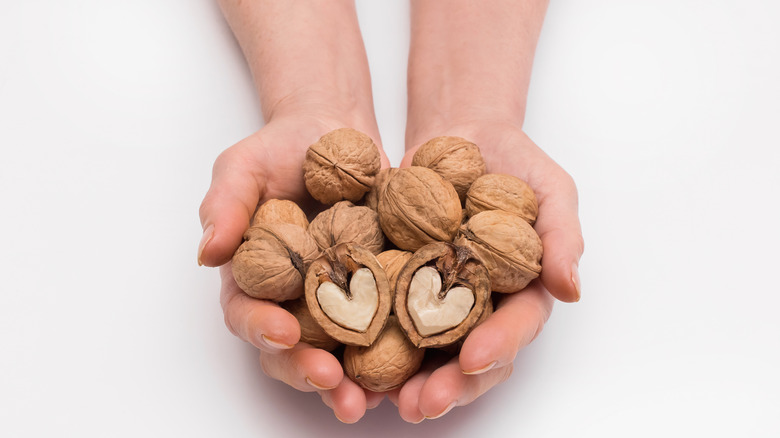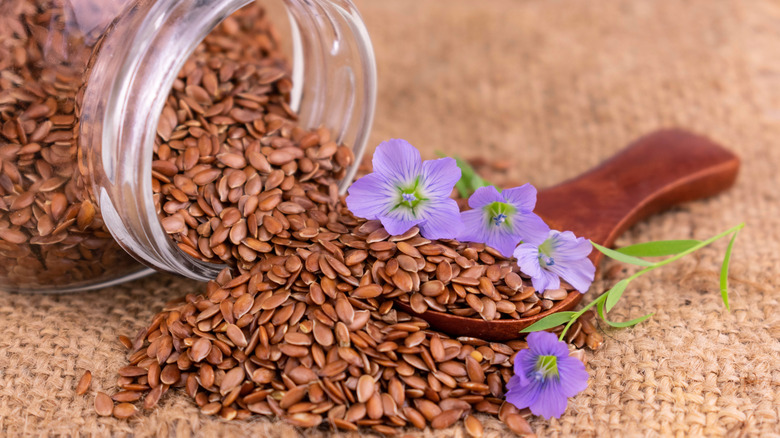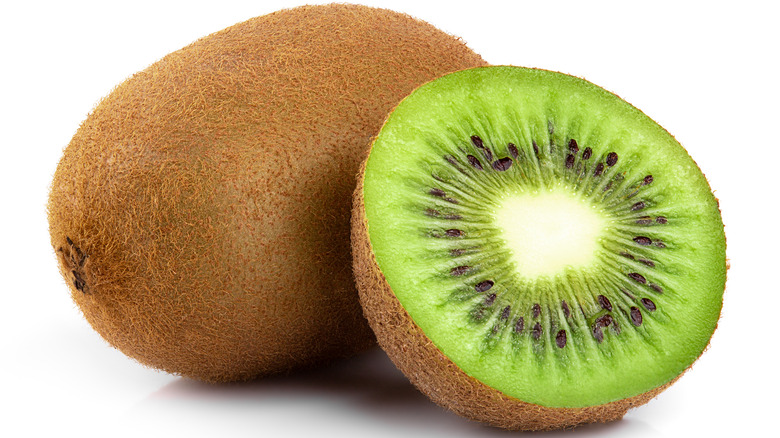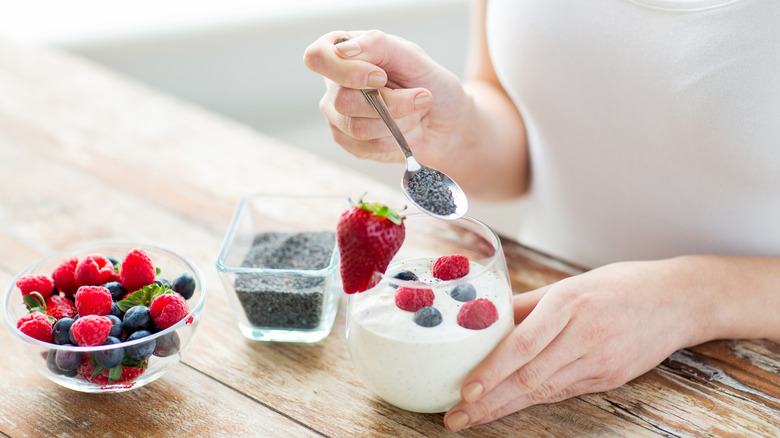12 Sources Of Healthy Fats You Should Be Eating
Just how vital are fats to our diet? More than you may think. Sure, they are tasty and can help you stay satisfied. But they also provide plenty of value when it comes to your health. Fats add to flavor, mouthfeel, and overall satisfaction. In fact, energy-dense foods (i.e., fats) are generally more appealing than those with few calories such as vegetables, according to the authors of "Fat Detection: Taste, Texture, and Post Ingestive Effects." So, adding a little fat to your veggies can make them more flavorful and help you get the most out of those nutrient-dense plant foods (via WebMD).
There are many good reasons to include them in your diet. Fats help with the absorption of vitamins A, D, E, and K, according to MedlinePlus. They also provide calories you can use for energy. What's more, they can provide essential fatty acids — such as polyunsaturated omega-3s — which support brain health, blood flow, and help to control inflammation.
Most people consume very little of those healthy unsaturated fats, according to Harvard T.H. Chan School of Public Health. But there is good reason to focus on getting a bit more. Taking in more polyunsaturated fats (up to 15% of your daily calorie intake) may lower your risk for heart disease.
How to Choose Healthy Fats
Not all fats are the same. So, when it comes to seeking out sources of healthy fats for your diet, it is best to choose those that contain mostly unsaturated fats (via Harvard T.H. Chan School of Public Health). Avoid trans fats whenever possible. These fats (i.e. partially hydrogenated oils) are found in highly processed foods. There are no safe levels of trans fats, as they contribute to a wide range of cardiovascular risk factors, according to a 2017 review in the Nutrition Journal. Saturated fats are those that raise your LDL ("bad") cholesterol, putting you more at risk for heart disease, according to MedlinePlus. It is best to keep them limited to no more than 6% of your daily calories.
Unsaturated fats, on the other hand, are healthy fats and may help improve your cholesterol levels. These include monounsaturated fatty acids (MUFAs) found in olive oil and avocado. Omega-3s, a type of polyunsaturated fatty acid (PUFA), are found in walnuts, flaxseeds, and fish (via Harvard T.H. Chan School of Public Health). While you may also find MUFAs in animal sources, it is best to obtain your healthy fats mainly from plant foods, according to MedicalNewsToday. That is because obtaining those MUFAs from plant sources is linked to lower risk for heart disease.
Fatty Fish
Fish is one of those foods that support your brain, heart, and blood vessel health, according Harvard Health Publishing. Fatty fish contain large amounts of unsaturated fats — in particular, omega-3s. Omega-3 fatty acids may contribute to lower levels of a protein known as beta-amyloid, which can form damaging blood clots in the brain.
Packed vitamins and minerals — including B12, vitamin D, and potassium — fish is a good source of nutrients that may help to lower blood pressure, according to the Washington State Department of Health. Additionally, replacing high-fat meats with heart-healthy proteins like omega-3-rich fish is recommended to lower risk for heart disease, according to Healthline. The American Heart Association recommends eating 6 ounces of fish per week, split into two 3-ounce portions. Good options include salmon, tuna, black cod, and striped bass.
If mercury levels concern you, it may be useful to know that 90% of the fish consumed in the United States is deemed safe by the FDA, as they have low mercury levels (via Global Salmon Initiative). And farmed salmon (versus wild) is still a good choice. With only 0.05 milligrams of mercury and an impressive 15 milligrams of DHA and EPA omega-3s (per gram), it meets the marks for one of the safest and healthiest options.
Olive Oil
You may have noticed that olive oil is used liberally in the Mediterranean diet (via WebMD). And as of 2022, the Mediterranean diet has once again been ranked the #1 diet by U.S. News & World Report — for the fifth year in a row. In fact, it received top ranking in several categories, including Best in Heart-Healthy Diets. So, might olive oil have a little something to do with that?
In elderly individuals with higher risk for heart disease, daily consumption of extra virgin olive oil was linked to a significant reduction in cardiovascular issues, according to a 2014 prospective study in BMC Medicine. Furthermore, each additional 10-gram-per-day increase of extra virgin olive oil brought about a 10% reduction in risk for cardiac events.
What is it about olive oil that helps keep your heart ticking? For one thing, olive oil is a rich source monounsaturated fatty acids. Oleic acid in particular has been shown to help with glucose regulation, according to a 2021 review in Nutrition Reviews. Additionally, extra virgin olive oil contains phenolic compounds that individually (and synergistically) have cholesterol- and lipid-lowering properties. In addition, while monounsaturated fats are predominant, just over 10% of the oil is comprised of polyunsaturated fatty acids, including omega-3s, according to Healthline.
Olives
Olives are sharp, tasty, and have a satisfying mouthfeel, so it may be hard to eat just one or two. But the good news is that they are also a nutrient-rich, low-cholesterol food, according to WebMD. Their high concentration of monounsaturated fatty acids gives them a supportive edge when it comes to protecting the heart. Oleic acid helps regulate cholesterol balance and blood pressure, too, according to BBC Goodfood. Additionally, olives are rich source of antioxidants, which may help prevent risk of chronic inflammatory diseases including atherosclerosis (via WebMD).
As a fermented food, olives may bolster gut health by providing beneficial bacteria to support digestion and immunity (via BBC Goodfood). And did you know that these small, bite-y morsels may contribute to bone health, too? Besides being a calcium-containing food (via Healthline), they contain particular compounds that may be supportive to bone structure and integrity, according to a 2016 review in the International Journal of Environmental Research and Public Health.
Olives may be plentiful in Mediterranean diets, which are notably heart-healthy, but for those who are salt sensitive, it may be best to enjoy them in moderation — because they are brined, they are higher-sodium food (per WebMD).
Chia Seeds
Whether you sprinkle them on your salads, blend them in your smoothie, or soak them into a pudding, those tiny Chia seeds pack a nutritional punch (via Healthline). Chia seeds are packed with alpha-linolenic acids, omega-3 fatty acids that are essential for health and immunity, according to a 2020 review in Molecules. And, because they're about 15-25% protein and contain considerable amounts of all nine essential amino acids, chia may be useful in preventing protein-energy malnutrition, according to a 2016 review in Journal of Food Science and Technology. Indeed, chia seeds have more protein per volume than quinoa (via Molecules). What's more, chia contains 9.8 grams of fiber per ounce (via MyFoodData), making it a good source of complex carbs. With a phenolic content of 8%, they contain high levels of several antioxidants including caffeic acid and quercetin, notable their anti-hypertensive effects (via Molecules). Additionally, chia is a source of B vitamins, as well as calcium and magnesium.
Avocado
The next time you eat a bagel, you may want to swap out the cream cheese for smooth, rich avocado. At just 114 calories, one half of an avocado (68 grams) contains 6.7 grams of monounsaturated fats, 345 milligrams of potassium, and 6 grams of fiber, according to Everyday Health. The fatty acids in avocado make it especially good for your heart, because those monounsaturated fats help control inflammation, lower triglycerides, and keep bring those HDL ("good") cholesterol levels ups, while lowering the LDL ("bad") cholesterol (via WebMD and Everyday Health). Its potassium is essential for fluid balance and keeping blood pressure under control (via Centers for Disease Control and Prevention), and it may also keep your heart ticking at a good pace, according to WebMD. Additionally, the fiber-rich avocado keeps you fuller longer and improves regularity (via WebMD). Finally, avocados contain plenty of other essential nutrients including fat-soluble vitamins E and K, as well as the antioxidants lutein and zeaxanthin, which are beneficial for your eye health (via WebMD).
Greek Yogurt
Several spoonfuls of yogurt may help ease those tummy troubles. That's because yogurt, a protein-rich source of fat, is also a rich source of probiotics (via Healthline). But you'll want to go with plain, low-fat yogurt, because many of the flavored varieties are high in added sugars. And when you go with a strained Greek yogurt, you'll get even fewer (natural) sugars than if you eat regular yogurt, according to Medical News Today.
Yogurt is comprised of fats, carbohydrates, and protein, giving it a well-rounded macronutrient appeal. According to MyFoodData, 7 ounces of plain Greek low-fat yogurt is 146 calories and contains 55% protein, 22% carbs, and 23% fat. Although this includes 2.46 grams of saturated fats, it also contains small amounts of both monounsaturated and polyunsaturated fats (per USDA). It is still a safe choice, as the American Heart Association recommends adults consume 2 to 3 servings of nonfat or low-fat dairy per day.
As you may be aware, that bacterial strains in yogurt (namely lactobacillus and streptococcus) are beneficial to the gut (via Livestrong). But yogurt has heart-protective qualities, too. According to a 2013 study in the British Journal of Nutrition, eating probiotic yogurt has cholesterol-lowering benefits. Additionally, fermented milk products may elicit anti-hypertensive effects, say the researchers. Possible mechanisms include yogurt's bacterial influence and its mineral composition (i.e. calcium and potassium). While fermented milk products show promise for treating hypertension, more research is necessary.
Eggs
One egg per day may keep your cardiac risk at bay, according to a 2018 study in Heart. It may sound surprising, but researchers found a link between eating an egg per day with more favorable cholesterol levels. An egg a day was also attributed to better blood sugar control and increased anti-inflammatory support.
According to the USDA, one large egg has a total of 5 grams of totals fats, with a triglyceride breakdown of 1.6 grams of saturated fats, 1.83 grams of monounsaturated fats, and 0.915 grams of polyunsaturated fats. And here's why you shouldn't skimp on the yolk: Albeit high in cholesterol, the yolk contains most of the nutrients in the egg (via MedicineNet). A rich source of unsaturated fats (including omega-3s), yolks are also high in calcium, zinc, B vitamins, and A, D, E and K.
What's more, eggs are an easy and affordable way to bump up the protein in your meals or snacks (via Northwestern Medicine). You'll get 6 grams of protein in just one egg. And that's plenty to keep you satisfied and prevent over-snacking. And just in case you were wondering, the nutrient-dense egg yolk contains nearly just as much protein as the egg white.
Tofu
Tofu is a quality plant protein you can easily add to your diet (via Cleveland Clinic). And because it is so versatile, it is a great way to cut back on red meat (via Self). Firm tofu is a great alternative filling for tacos, and extra-firm tofu works well in stir-fries and kebabs, according to Livestrong. Because it is bland, you can season it liberally and in a variety of ways (via Self).
Fun fact: Just 4 ounces of firm tofu packs in a bit more non heme iron than an average portion of red meat (via Runners World). Tofu is also cholesterol-free, low in calories, and an excellent source of calcium. Its phytoestrogens support bone health and may be protective against heart disease and certain cancers (via Medical News Today). And if you are worried about the risks of estrogen-containing foods, rest assured that a moderate amount is probably just fine, according to a 2016 review in Nutrients.
Additionally, tofu is a great way to get in those essential fatty acids. Its fat content is comprised of mainly polyunsaturated fats (46-62%) including omega-3s (via Nutrients). It also contains some monounsaturated fats, and relatively little saturated fat.
Pistachios
Pistachios provide a powerful nutritional boost and they are rich in antioxidants, too. These small green morsels pack in those cholesterol-lowering monounsaturated fats, according to the Cleveland Clinic. They also contain nutrients that support healthy blood flow, including vitamin B6. And they are a rich source of antioxidant nutrients. Furthermore, just one ounce of pistachios (1/4 cup) contains an impressive 6 grams of protein and 3 grams of dietary fiber (via MyFoodData). And at just 160 calories per ounce, they are one of the least caloric nuts, according to Health. Because they are smaller than most, you'll get to eat more of these nuts per 1-ounce serving (i.e. 49 pistachios has the same amount of calories as 23 almonds).
What's more, its unique coloring reflects the antioxidants it provides (via American Pistachio Growers). The purple in the nut's skin comes from anthocyanins; the yellow center of the nut is catechin-derived — adding to the nut's anti-inflammatory, cardio-protective qualities. The green hue of the nut's outer layer comes from vision-supporting carotenoids, lutein and zeaxanthin.
Walnuts
Walnuts are not only good for your heart, but also your brain (via WebMD). In fact, they reduce risk for type 2 diabetes and heart disease, inflammatory conditions that are also risk factors for dementia, according to a 2020 article in Nutrients. Additionally, several studies have linked walnut consumption to improved cholesterol levels, reduction in arterial plaque formation, and lowered blood pressure — all cardio-protective factors.
Walnuts contain a wide variety of antioxidants, including ellagic acid, melatonin, and gamma tocopherols, which have impressive capability to scavenge those damaging free radicals. And they contain high levels of omega-3 fatty acids, most notably alpha-linolenic acid, which has strong anti-inflammatory capabilities.
If you want to keep your mind sharp and your heart healthy, consider eating them daily. Researchers suggest that consuming 1 to 2 ounces of walnuts per day can improve your cognition. This is in line with the American Heart Association recommendations of eating 1 ½ ounces of nuts, 4 times per week (via Mayo Clinic).
Flaxseeds
Flaxseeds are a rich source of phytonutrients and healthy fats, and even have a considerable amount of plant protein (via Livestrong). These seeds contain substantial amounts of lignans, phytoesterols, and omega-3 fatty acids, all of which improve cholesterol and cardiovascular health (via Medical News Today). Lignans have antioxidant-like properties that help reduce damaging free radicals and oxidative stress. Omega-3s and phytoesterols have properties that help decrease LDL cholesterol.
The American Heart Association recommends increasing both fiber and polyunsaturated omega-3s to keep your heart healthy. Just two tablespoons of omega-3 rich flaxseeds contain 5.6 grams of dietary fiber and nearly 4 grams of protein, as per the MyFoodData. And even better, they contain less than 1 gram of saturated fats.
Flaxseeds are also a good source of magnesium. Add just two tablespoons to your smoothie or salad to get a boost of 80.8 grams of magnesium, nearly 20% of the daily value (via USDA). According to the Mayo Clinic, adequate levels of magnesium should be maintained because chronically low levels can increase risk for hypertension.
Kiwi
Those tiny black seeds in the flesh of a kiwi contain essential fatty acids, thus making this fruit a source of healthy fats (via Livestrong). While the fats in kiwi are minimal, their impact is substantial. That's because omega-3s have a positive impact on heart health. With a favorable ratio of omega-6s to omega-3s, kiwis are less likely to contribute to inflammation, a factor which is higher when people consume too many of the omega-6 fatty acids.
Kiwis are also an excellent source of immune-boosting vitamin C, according to 2018 review in the European Journal of Nutrition. A potent antioxidant, it protects against free radical damage. Vitamin C is also important for collagen production, improving iron absorption, and reducing fatigue, say the researchers. And, kiwis are ideal for digestive health. In addition to their substantial soluble and insoluble fiber, kiwis contain a unique enzyme called actinidin that helps break down proteins and aids in both gastric and intestinal digestion.
Best Ways to Add Healthy Fats into Your Diet
Replacing foods rich in saturated fats with healthier fat options is a great way to support your heart, according to the Harvard T.H. Chan School of Public Health. Doing not only reduces LDL cholesterol, but also bumps up the good HDL cholesterol. Additionally, it may also support healthy blood sugars to reduce diabetes risk. The following are some ways you can add healthy fats into your diet.
Greek yogurt is a healthy alternative to butter and cream in many recipes (via Everyday Health and Greatist). And there are several other ways this food can replace those highly saturated fats in the diet. Add a dollop to your chili to replace the sour cream, use it as an addition to pasta sauce for added creaminess, and spread it on toast or crackers (via Medical News Today).
Nuts and seeds are also great ways to get in those heart-healthy fats. And they are a great alternative to (chopped) bacon or croutons, says the Cleveland Clinic. You can also sprinkle them in your stir-fries, use them as toppings on your yogurt for some added crunch, toss them into your salads, and enjoy creamy natural nut butters as snack spreads. But stick to 1-ounce portions, as they are calorically dense.
And finally, let's explore avocado. You aren't limited to avocado toast or guacamole (delicious as they may be). There are plenty more ways to get them into your meals (via Healthline). You use it a sandwich spread (to replace the mayonnaise), serve it with your eggs, add chunks to your salad, and blend it into your soups (hot or cold). You can even use avocado as a topping for favorite crowd-pleasers like pizza, burgers, and tacos. It's a great way to cut back on (or use less of) the cheese (via Simplemost).
